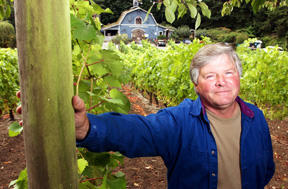After 25 years of operating in Winslow just off Highway 305, Bainbridge Island Vineyards and Winery owners Gerard and Joann Bentryn are putting the downtown property up for sale.
Their hope is to rebuild a tasting room and sales facility on their other property on Day Road East, where they grow most of their grapes. But their ability to do so depends on whether the city will amend the zoning code to allow year-round sales at that location.
“It will depend on whether the island wants us or not,” Gerard Bentryn said. “People at the city say helping farmers is the number three thing on their list, but they never seem to manage to finish the first two things.”
Bentryn had proposed an “agricultural overlay” amendment to the city’s zoning code, which would give farmers the right to sell agricultural products all year, not just during harvest season.
And while city officials expressed sympathy and support, he said, the ordinance hasn’t actually yet been passed.
The time-consuming nature of the code-amendment process doesn’t fit well with the immediate needs of viticulture, he said.
“We don’t have the luxury of stopping, because you don’t lose one year, you lose three or four,” he said. “If we move at the end of next year, we have to have a place for the grapes that October.”
A local couple that he declined to identify is interested in buying the three-acre highway property and developing townhomes, Bentryn said. But they need city and state approval to run a sewer line from the property down the state highway to connect to the city’s main line.
What is prompting the sale, Bentryn said, is economics, both the island’s and his own.
“We continue to gross between $250,000 and $280,000 per year, but with rising costs, our net has dropped from around $50,000 to about $20,000,” he said. “And we are over 60 – we can’t keep doing this forever. We own $2 million in real estate, so what are we going to do?”
Rising property values on the island create a difficult situation, he said.
Although taxes on his land are kept down by its agriculture-preserve status, the buildings are taxed at Bainbridge rates.
As the island gets more urbanized, Bentryn said, it becomes more difficult to move back and forth between the two facilities.
“We used to be able to move tractors up and down the road,” he said, “but there’s more traffic and less patience today.”
While the business sells all the wine it can produce, Bentryn is a bit put off that he can’t begin to charge the premium prices that some of the larger wine-makers can fetch, a situation he blames on ubiquitous but often misleading advertising.
“People pay premium prices for some wines that they think are scarce, when in fact there are hundreds of thousands of cases being turned out,” he said. “But they won’t pay more for our wine because it doesn’t have the snob appeal that advertising creates. The fake is accepted, but the real confuses people.”
What Bentryn values about the wine-making experience is the connection to the land.
“I wanted to make wine because I wanted to grow grapes,” he said. And he wants to infuse others with that same spirit.
His dream for the future is to create what he calls the Bainbridge Island Slow Food Institute, where visitors could experience the whole gamut of growing, cooking and experiencing food and wine.
“The difference between experiencing a fine restaurant and experiencing food and wine where you have been involved in growing and preparing is the difference between a fling and love with someone you really care about,” he said. “The connectedness creates such an incredible experience.”
He would also like to see the city use some of its open-space bond money to preserve farmland – including his Day Road property.
Figuring that land for farming is worth about 10 percent of the going rate for Bainbridge land, he suggests the city pay 90 percent of the value, then allow the farmer to resell the land to another farmer for 10 percent. If the land ever stops being used for farming, the city could pay the remaining 10 percent, and turn the property into open space.
The benefit to the rest of the island, Bentryn said, is preservation of a scenic amenity – an agricultural vista.
“If the island lost the winerey, it would be a poorer place for it,” he said. “People don’t want to lose those expansive vistas. We’re literally landscape art.”



